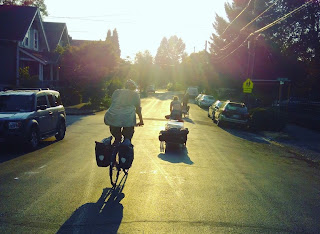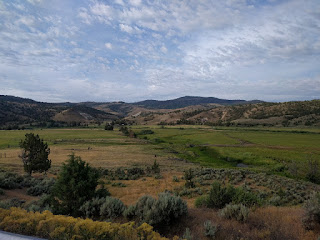So simple living is a way to put our money where our mouth is -- in other words, take a holistic view, to integrate all parts of our life into a whole, we might say to live with "integrity". The reason we practice this kind of simple living is that we desire to be kind to those we love, and recognize that we love all beings -- ourselves, other people, animals, and I say even the trees and mountains. The same way we try to be kind to those closest to us, and we try to avoid harming them, we can practice being kind and avoiding harm to all. When this happens, we are more able to appreciate and enjoy the beauty of all beings, similar to how we are able to appreciate and enjoy the beauty of those we love most.
So what could simple living look like in 2017 America?
I can't imagine there's a single general answer, but all of us have steps in this direction that we could take. Everyone who wants to be kind and stop harming others will find some steps easier to take than others. There are steps that will be easy for one person to take, while being extremely difficult or impractical for someone else. It's helpful to be in a place of genuine love, not trying to justify one's actions to feel less guilty, and not trying to impress others. Perhaps when we're coming from a place of genuine loving kindness, we can celebrate any step that anyone is taking, and we can freely admit our own struggles and the things we do that we feel are harmful but that we are not ready to change for whatever reason.
Maybe a good practical starting place is, wherever we might spend money, to look deeply at what we are paying for and what the consequences are. Question it with curiosity. What pollution and destruction and oppression is required to give me this thing, and am I paying to support that pollution and destruction and oppression? Do I really need it? If I really need it, is there an alternative that is less harmful? Am I paying for someone else to do work that I would consider beneath my dignity?
Questioning even one purchase this way could feel overwhelming due to the complexity of today's economy -- and I think that in itself is a valuable insight. Some are simpler, for example if I buy a banana, I'm giving more profit to the fruit companies that conquered Central America and killed/enslaved/displaced the people there, and continue to occupy the land and destroy rainforest. Some purchases might seem more benign at first, but on investigation we can see they are entangled with all kinds of destruction and suffering around the world. The purpose of questioning is not to feel guilty about what we've done, or to figure out a way to justify our actions, but to help us practice kindness toward what we love.
In Portland, in the Food Not Bombs community I wrote of earlier, I found people questioning almost everything in this way, and avoiding harmful things as each had the ability or courage to do so.
Here are some examples of harmful things people were avoiding, which we can all try avoiding to varying extents:
- paying for cars to be driven
- paying for airplane flights
- buying animal products
- buying non-local, non-organic, or packaged food -- this is a big topic I'll say more on someday
- buying food from corporations
- buying anything produced with slave labor
- buying anything produced with any destructive means
- paying taxes
- investing money in harmful business or organizations
I am not completely avoiding all of these things, but I do feel the cognitive dissonance each time I give money toward one of them.
I still possess things that had a high cost in destruction, and will again if I someday replace them. Most obviously my electronics: smartphone, laptop, and camera. Even just possessing them, there is a cost, because I could sell or give them away to someone else who would have bought them new, which would reduce the demand by one. Another one I have yet to address in my own life is investments. I have a lot of money invested in index funds, because that's what you do when you save money, and I know I am helping to fund large scale destruction... perhaps it won't be long before I figure out what to do with that money instead.
But can one person's actions make a difference?
Yes. We know this intuitively, that when we do harm or show kindness to another being, it matters. If anything matters, this does.
Consider the destruction of beautiful forests and rivers and wildlife and cultures and villages that has been paid for by the demand of the "developed" world, and take one individual's share of that, one billionth or whatever it might be. Just in terms of acres of habitat destroyed or polluted, one individual's share is quite significant. This is not just statistics -- somewhere, actual trees and animals and indigenous people were killed, and the water poisoned. I don't want to pay for that.
There are lots of other logical arguments for how one person's actions make a difference, but logical arguments eventually become wearisome. It is beauty that I love, and whether I can accurately quantify the effects or not, I want to live in a way that feels true and honest in the face of the beauty that I love.










































































